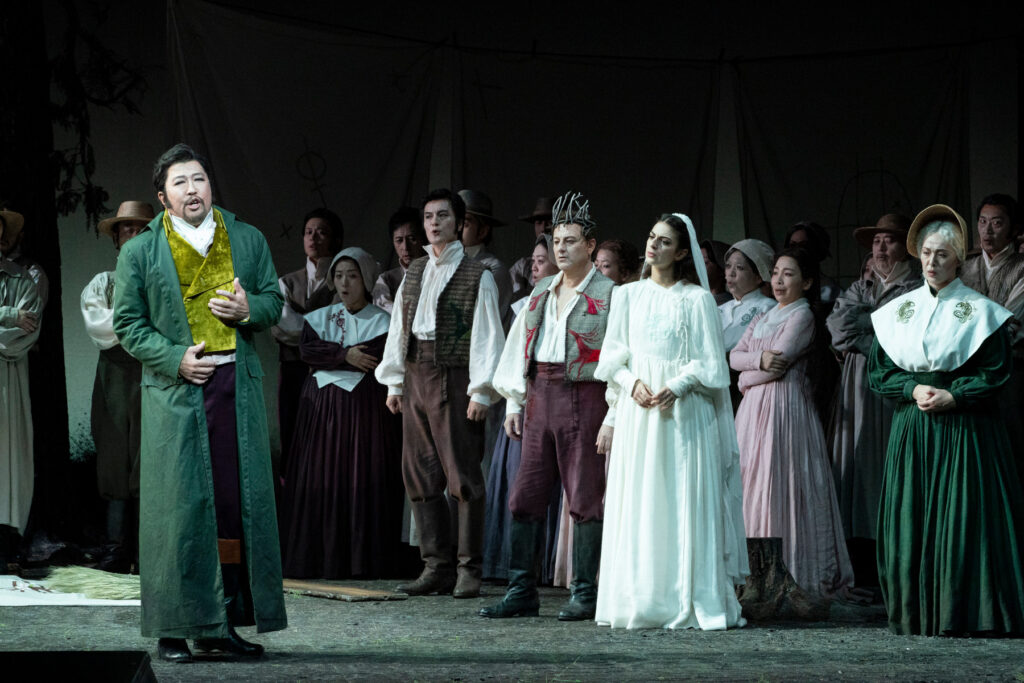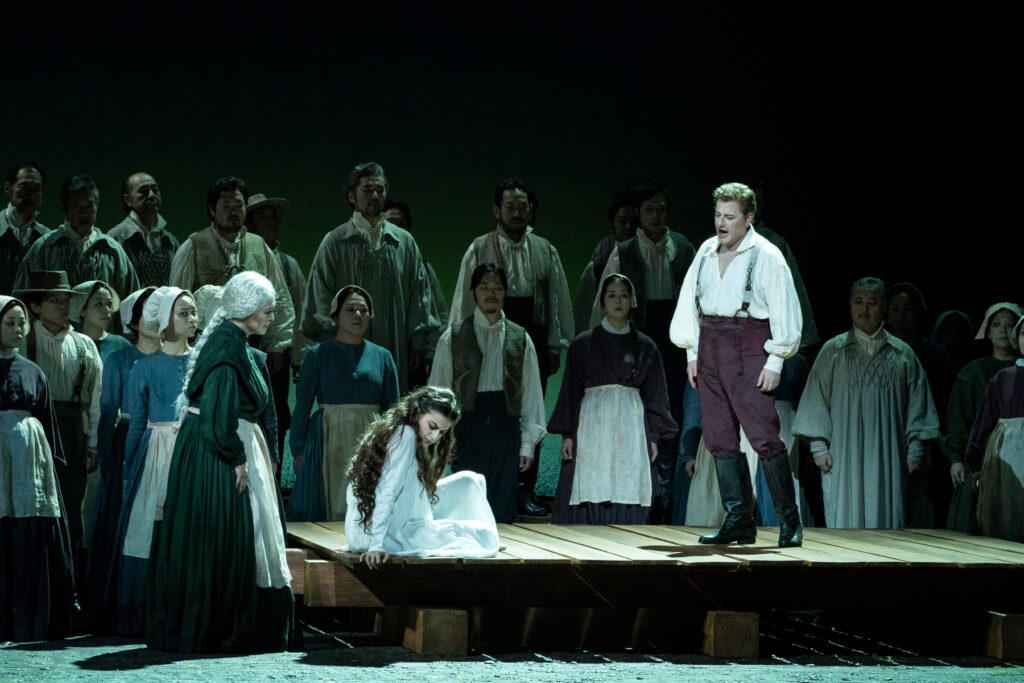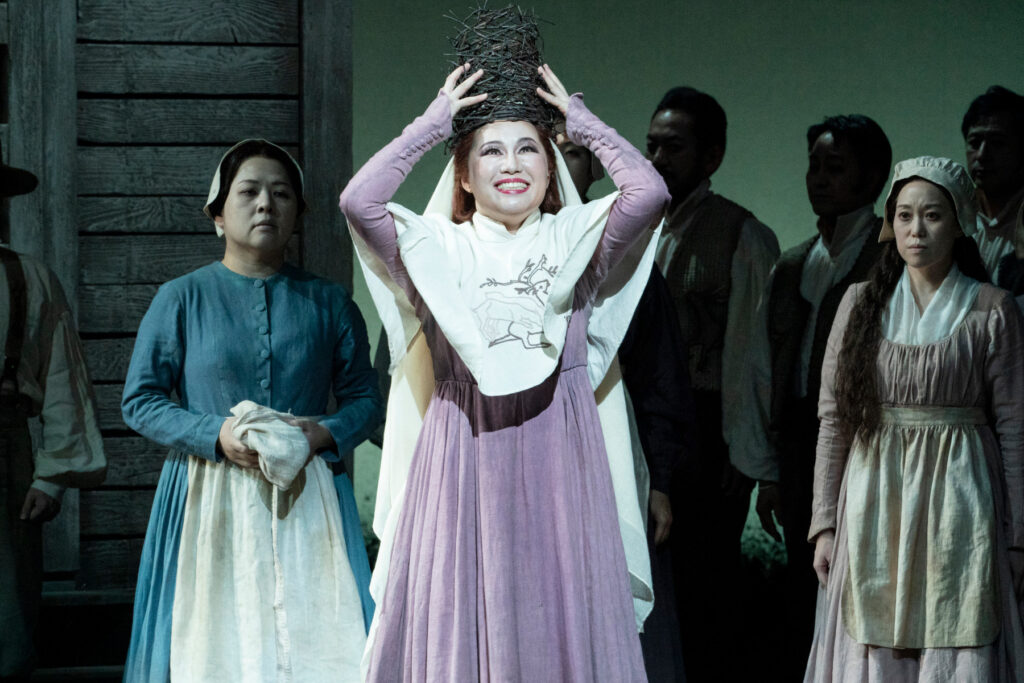The NNTT’s 2024/2025 season opened with Vincenzo Bellini’s bel canto masterpiece, La Sonnambula (The Sleepwalker), seen on October 12. A co-production with Madrid’s Teatro Real, Barcelona’s Gran Teatre del Liceu and Sicily’s Teatro Massimo di Palermo, this was the first Bellini work to be staged at the NNTT in its 27-year history. Directed by Catalan actress-turned-director Bárbara Lluch with lucid touches of modernity and feminism, this production had been premiered in Madrid in December 2022. In Tokyo, the rising star Claudia Muschio (Amina, house debut) and the veteran Antonino Siragusa (Elvino), both experts in the bel canto tradition, enthralled the audience with their stunning performance under the baton of the renowned Maurizio Benini.
Lluch used ten dancers clad in ragged, grey outfits, and with dirty faces, to emphasize the heroine’s “anxiety of feeling different” (Production Note) as an orphan in a closed-off village. These dancers opened each of the two acts and followed Amina during critical moments, eliciting her nocturnal sleepwalk. Together with the massive, ubiquitous and uncannily expressionless chorus, reminiscent of Japanese Kabuki or Noh, these eerie dancers – representing her inner turmoil – gradually pushed Amina to the edge, leading to the startling final scene.

Claudia Muschio’s Amina was phenomenal. This young Italian soprano, having recently debuted in the same role at the Staatsoper Stuttgart to great acclaim, enamoured the audience with the lyricism and warmth of her beautifully controlled voice and exquisite messa di voce (a gradual crescendo and decrescendo on a long, sustained note). Her “Sovra il sen la man mi posa” in Act 1 was utterly delightful, and her sotto voce “Elvino… Elvino…” in the sleepwalking scenes mesmerizing. Muschio was also a very engaging actress: her complete absorption of the role in all its emotional complexity was captivating. In the gripping last scene, she sang her two grand arias from a high platform on a church-like building (4.5 meters high): one simply could not take one’s eyes off her. Surprisingly, she was not joined by Elvino after her poignant “Ah! non credea mirarti,” despite his “Il tuo sposo è a te vicino” (your husband is beside you). The contrast between her innocently jubilant “Ah! non giunge uman pensiero,” sung totally alone on the platform (atmospherically lit by Urs Schönebaum), and the gloomy congratulations from the villagers below, including Elvino, was simply appalling. The audience was left in suspense: is Amina going to jump in a fit of – anger? Or, is she escaping into another world? Is she really awake? This was a compelling climax, casting doubt on the happy-ever-after storyline of La Sonnambula.

As Elvino, the eminent Sicilian tenor Antonino Siragusa combined a natural stage presence with a radiant tenor voice that soared over the orchestra. With superb vocal agility and immaculate diction, he was at his finest when beseeching Amina’s pardon for his irrational jealousy in Act 1. His heart-wrenching aria “Ah! perché non posso odiarti” in Act 2 was also splendid.
The rest was entrusted to Japanese singers. Hare Ito convincingly conveyed Lisa’s envy in a passionate, powerful voice. As Count Rodolfo, Hidekazu Tsumaya was appropriately authoritative and resonant. It was a pity that the surtitle of his nostalgic aria, “Vi ravviso, o luoghi ameni,” did not fully reflect its pathos. Mutsumi Taniguchi sang the role of Teresa, Amina’s foster mother, most impressively with her deep, affectionate voice. Kei Kondo and Masachika Watanabe were an assured Alessio and Notary respectively.

At the helm of this outstanding production was Maurizio Benini, whose profound love for the voice was manifest in every corner of his conducting. Knowing this opera inside out, he breathed long phrases into the music without affecting the drama. The Tokyo Philharmonic Orchestra answered his baton with accuracy and avidity. The contribution of the chorus, as the fourth soloist, was equally exceptional. In short, this is a sovereign production that will long linger in the memory.
Natsuko Hirakura
La sonnambula
Composed by Vincenzo Bellini
Libretto by Felice Romani based on La somnambule, ou L’arrivée d’un nouveau seigneur by Eugène Scribe and Jean-Pierre Aumer
Cast and production staff:
Il conte Rodolfo – Hidekazu Tsumaya; Teresa – Mutsumi Taniguchi; Amina – Claudia Muschio; Elvino – Antonino Siragusa; Lisa – Hare Ito; Alessio – Kei Kondo; Un notaro – Masachika Watanabe
Conductor – Maurizio Benini; Production – Bárbara Lluch; Set Design – Christof Hetzer; Costume Design – Clara Peluffo; Lighting Design – Urs Schönebaum; Choreographers–Iratxe Ansa and Igor Bacovich; Associate Director – Anna Ponces
New National Theatre Chorus, Tokyo Philharmonic Orchestra
New National Theatre Tokyo, Saturday the 12th October 2024
All photographs © Rikimaru Hotta